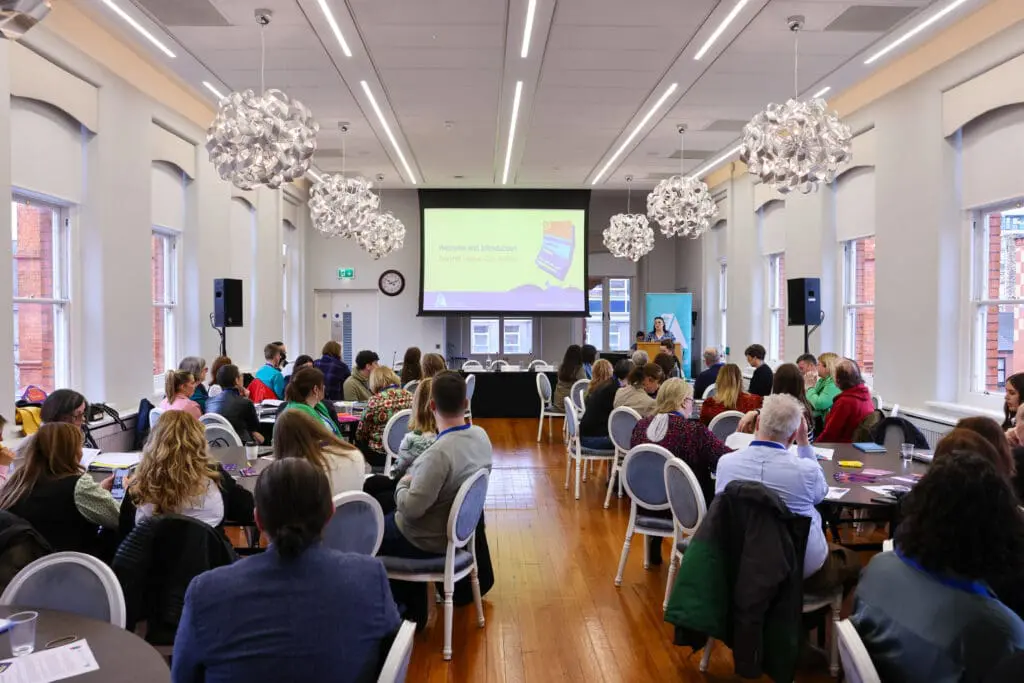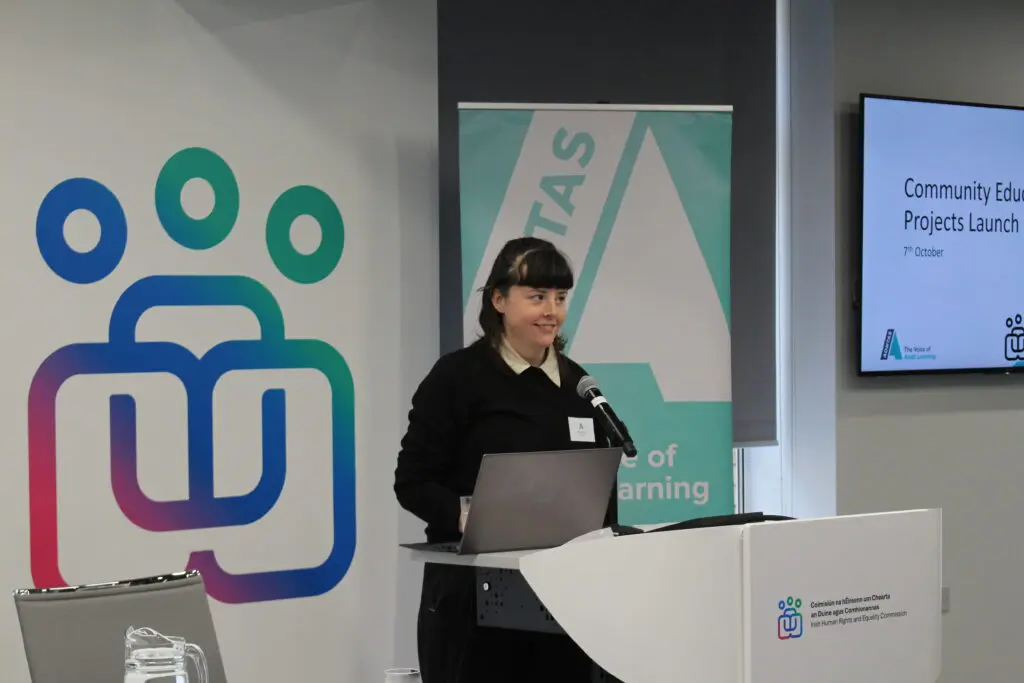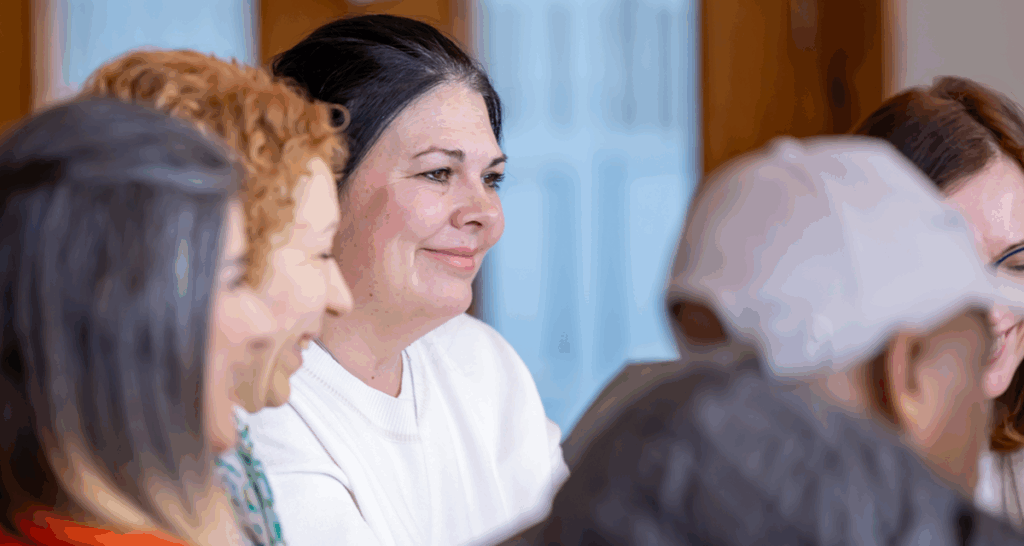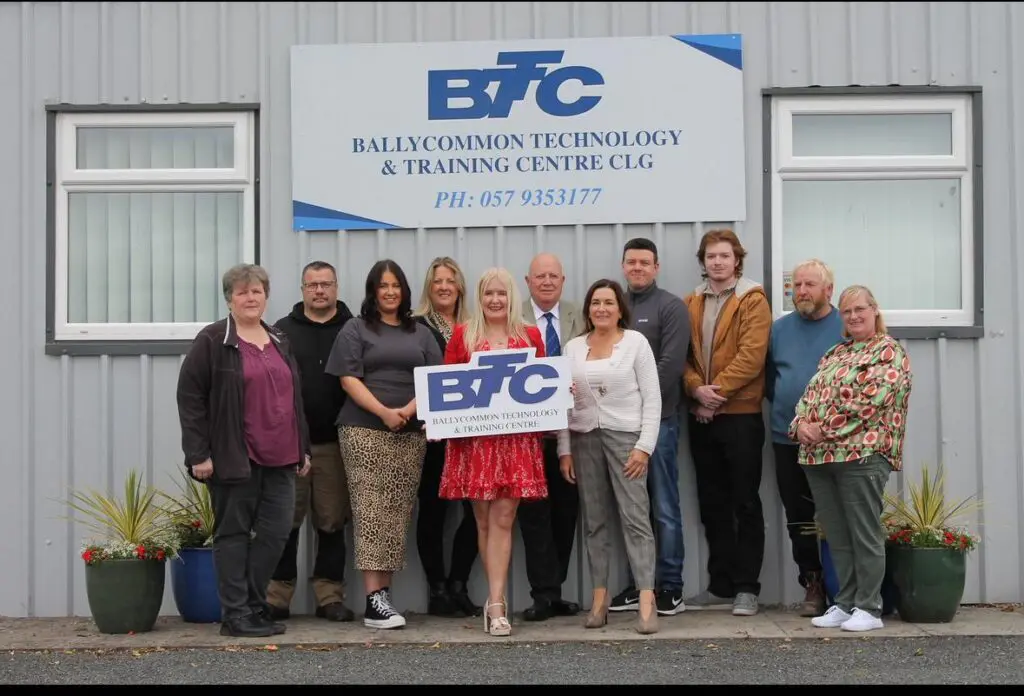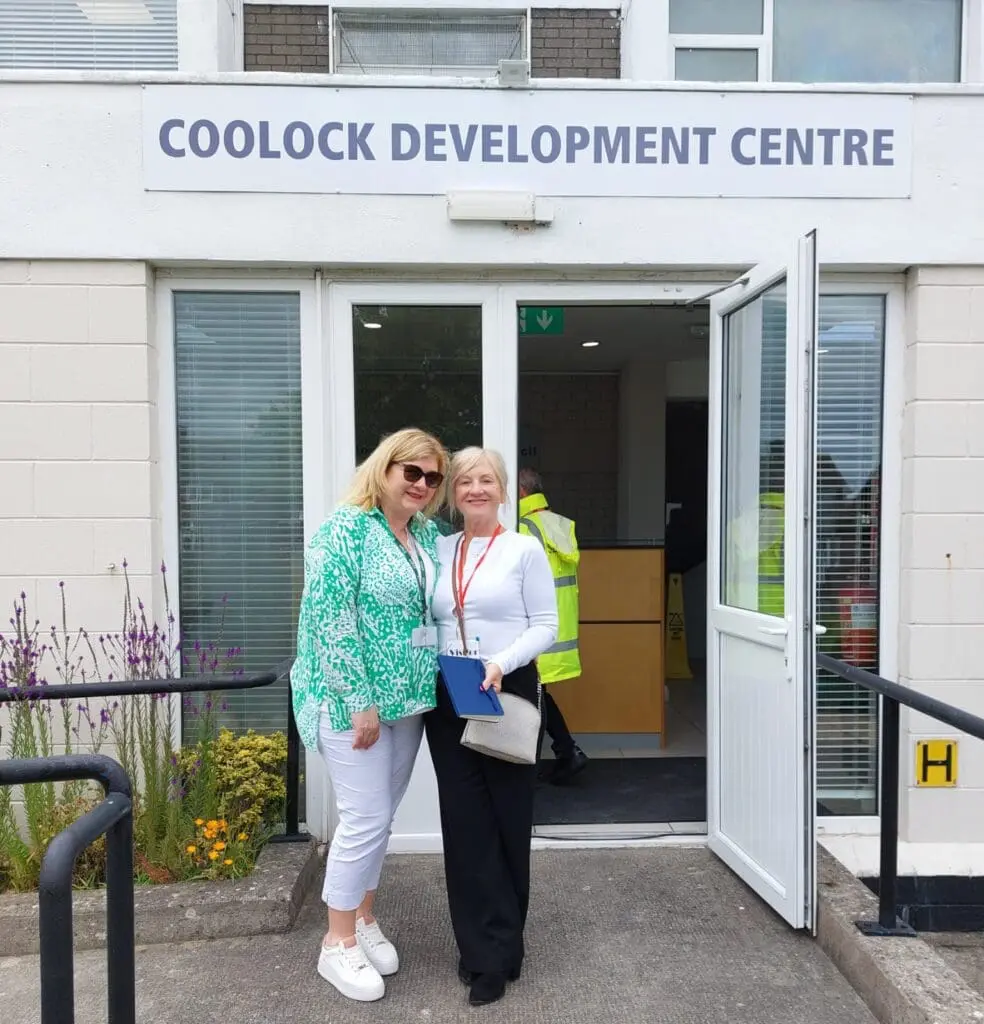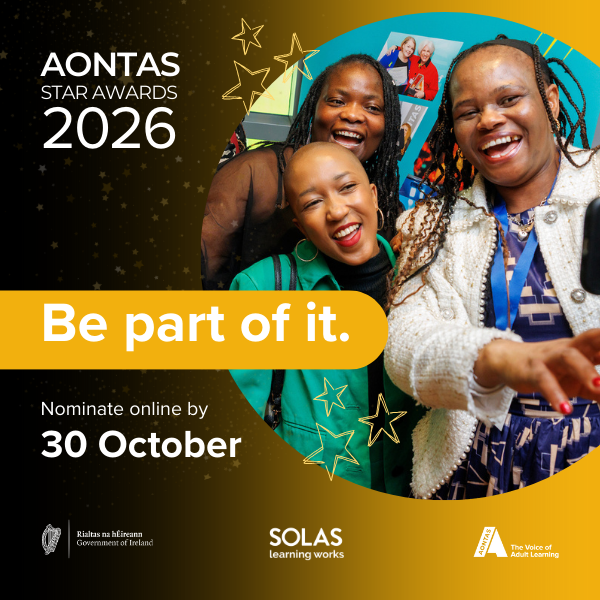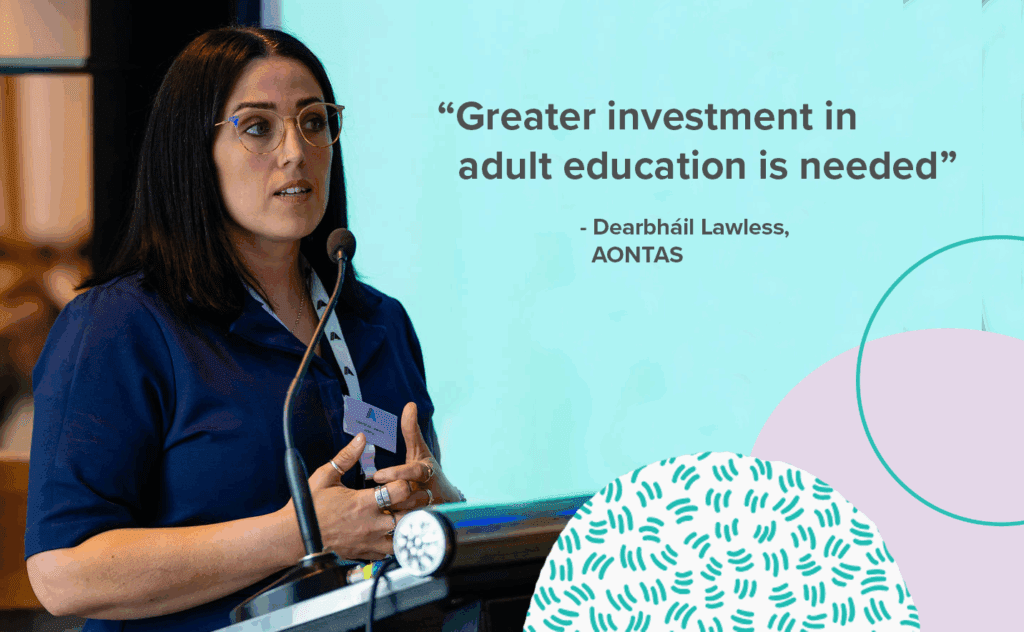It featured speeches and inputs from policymakers, adult learners, and educators, as well as Barbara’s presentation on our research findings into what is needed to better support adult learners, and potential adult learners, across the island of Ireland.
The research findings focus on the impact of the cost-of-living crisis and the housing crisis on learners, and also the gaps in Government funding for adequate and affordable State-funded childcare and transport costs. It also shows that information and processes on funding for adult and community education can be difficult to access, likely to use jargon, and inconsistent across different counties in Ireland.
“We’re hearing from adult learners that they’re facing greater financial challenges,” Barbara told the audience, “and these are growing.”
While there has been an increase in funding for the adult learning sector in recent years, there is still a lack of investment in people – in the adult learners themselves and what they need if they are to return to and stay in education. A whole-of-Government, cross-departmental, and cross-societal approach is needed to change this, as agreed by learners and educators in the room on Monday.
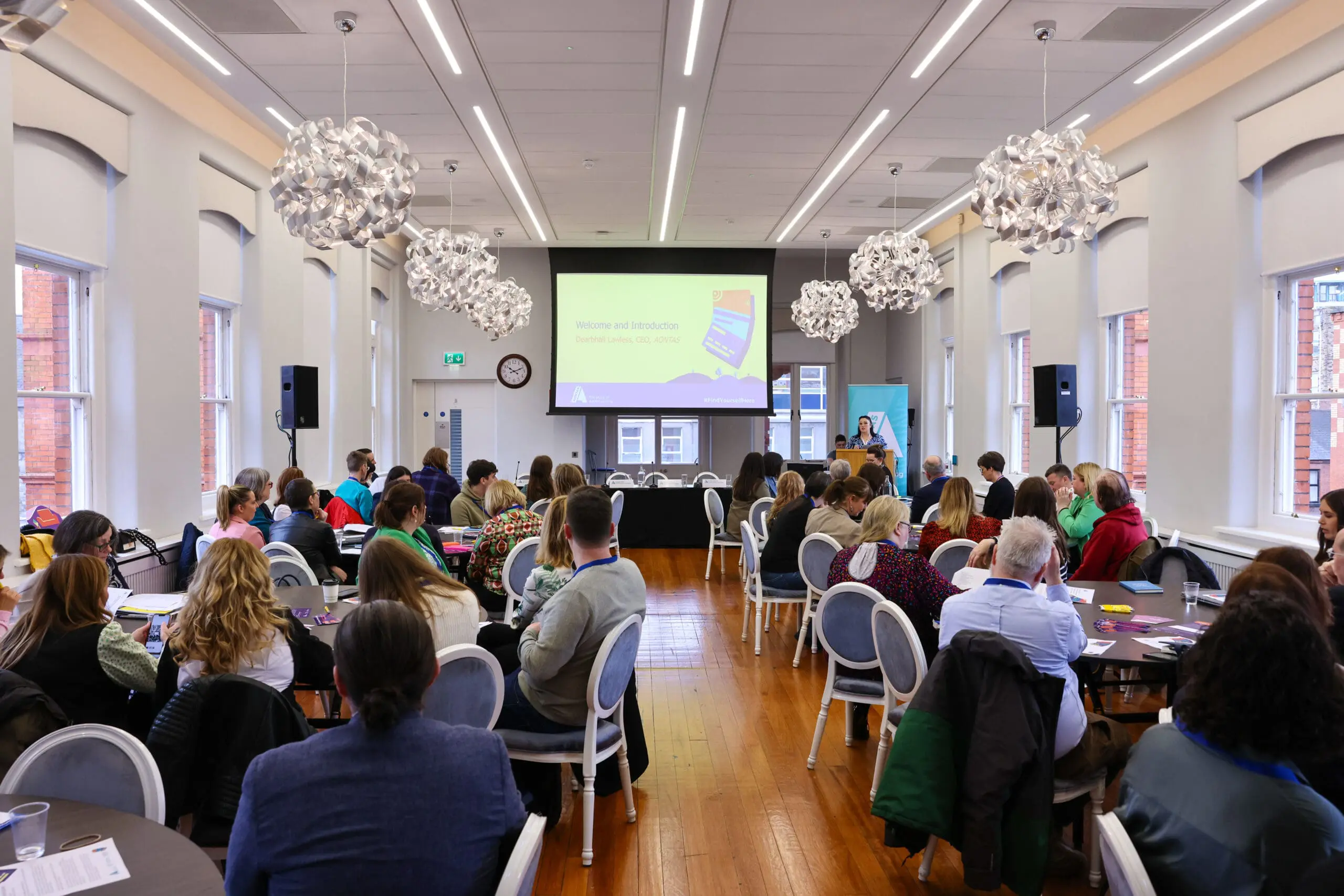 Adult learners are a particularly diverse group. People in adult and community education are more likely than those in Higher Education to have had negative experiences at school, to have left school early, to be living in or at risk of poverty, to be lone parents or people with caring responsibilities, to have disabilities, or not to have English as their first language.
Adult learners are a particularly diverse group. People in adult and community education are more likely than those in Higher Education to have had negative experiences at school, to have left school early, to be living in or at risk of poverty, to be lone parents or people with caring responsibilities, to have disabilities, or not to have English as their first language.
Greater investment in learners in Further Education and Training (FET) and community education is needed because our research shows, as Barbara shared, that these learners are “more exposed to societal inequalities that create barriers to education. This means that in general FET and community education learners are more vulnerable to poverty and the financial challenges posed by cost-of-living increases.”
We at AONTAS will be leading a national campaign this year calling for increased financial supports for adult learners. This was the focus of discussion for the day, and the contributions made by learners and educators will inform our campaign.
To demonstrate the lived experience of learners, we invited three people who had gone back to education to speak about the impact that a lack of sufficient financial support has in their lives. These were Adele O’Connor, who is now a programme manager at Doras Buí resource centre, Marlene Conway from Longford Women’s Link, and Sultan Ahmed, a learner at Waterford and Wexford Education and Training Board. The discussion was hosted by adult learner and Belmayne Community Activist Michelle McGoldrick.
Adele spoke powerfully about the value of education in her family, and the impact that education has had on her family across the generations. She told us that her father had to leave school at 11, despite being highly intelligent, but her mother stayed on in school. Now, out of her seven children, five have Masters degrees and Adele is doing a PhD. She said her father was excellent at mathematics and her own daughter has now graduated with a mathematics degree.
“Education is power,” Adele said, and always a source of pride in her family. But she spoke about the pressures of caring for her family and the lack of financial supports, and how this limited her choices.
Adele told the group:
“I feel that there are a lot of intelligent people in low paid jobs they can’t afford to give up to further their education. This is particularly true if they have children or family members that rely on them. They could be prepared to make sacrifices for themselves, but it is difficult when you have dependants.”
This was also reflected by Marlene, who said that “‘Mammy Guilt’ was a big thing over my time studying. The kids missed out on holidays and days out due to money and time.” Doing her degrees also caused a strain on her finances. She said, “Longford Women’s Link is great and they have funded part of both my degrees. But I had to come up with the rest of the funding myself.”
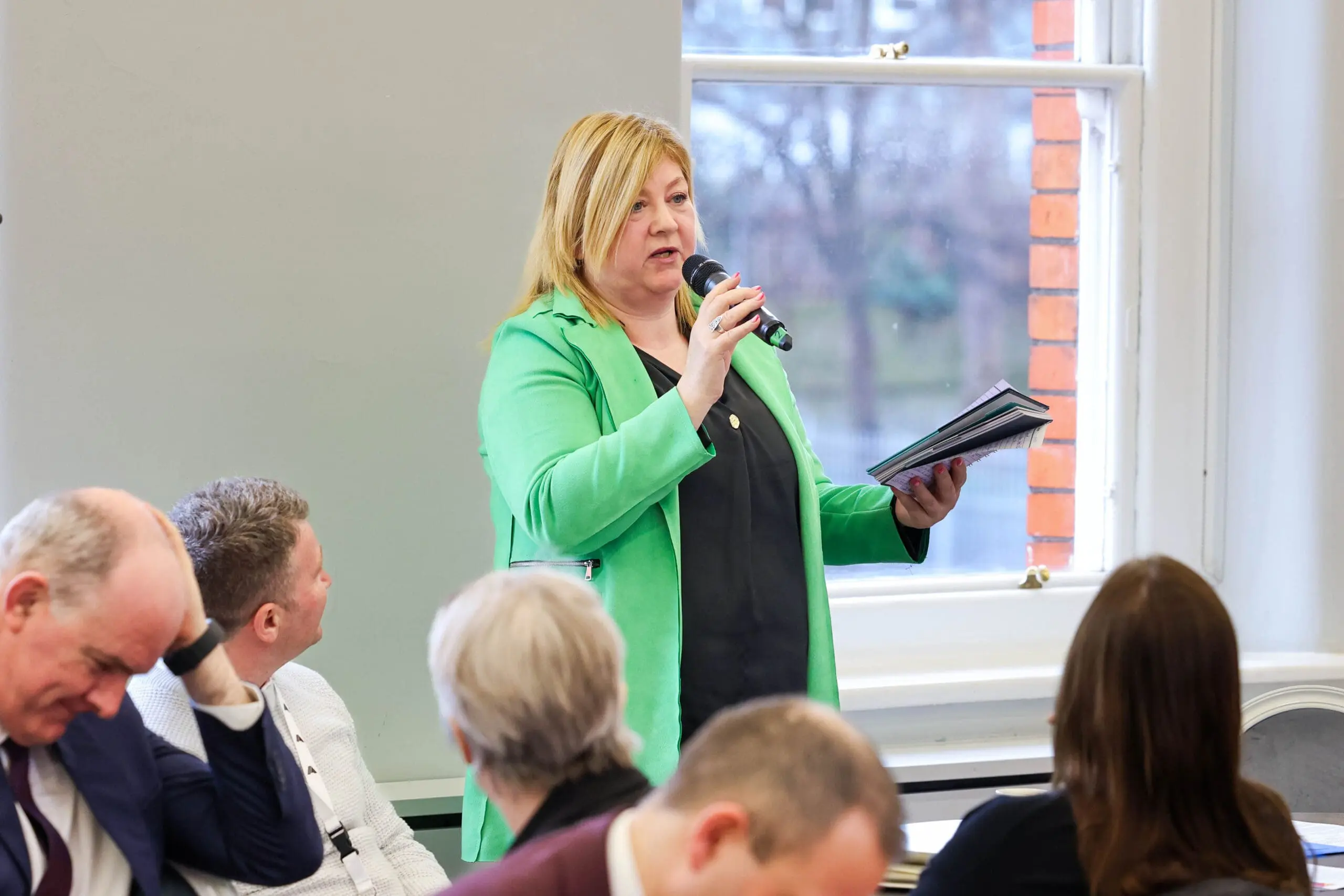 Adele O’Connor, programme manager at Doras Buí
Adele O’Connor, programme manager at Doras Buí
Pressure and stress around money and time when completing programmes and degrees were clear issues for all three learners. Sultan spoke about the lack of access to financial supports available to him, as it is Government policy that people coming from outside Europe must live in Ireland for more than three years before getting access to support. He is studying Healthcare Support at QQI Level 5, and spoke about having to stay up until 3am nightly to complete assignments.
Sultan told us:
“I am facing some challenges. I am originally from Bangladesh. I am not eligible for any financial supports until I have stayed for three years in Ireland. But to complete this course, I must complete 150 hours of work experience without pay. Most nursing homes, however, use trainees as full-time workers.
Between work placement, and working in a job to support my family, with accommodation and food costs, I work 50/55 hours per week. I also do five days a week at college and my assignments at night. So, I have found it difficult for us to survive in Ireland.
I think it should be allowed for non-EU students to get financial support during their courses. For work placement, the hours could be divided into, for instance, 50 hours without pay and 100 hours with basic pay. This would be very helpful.”
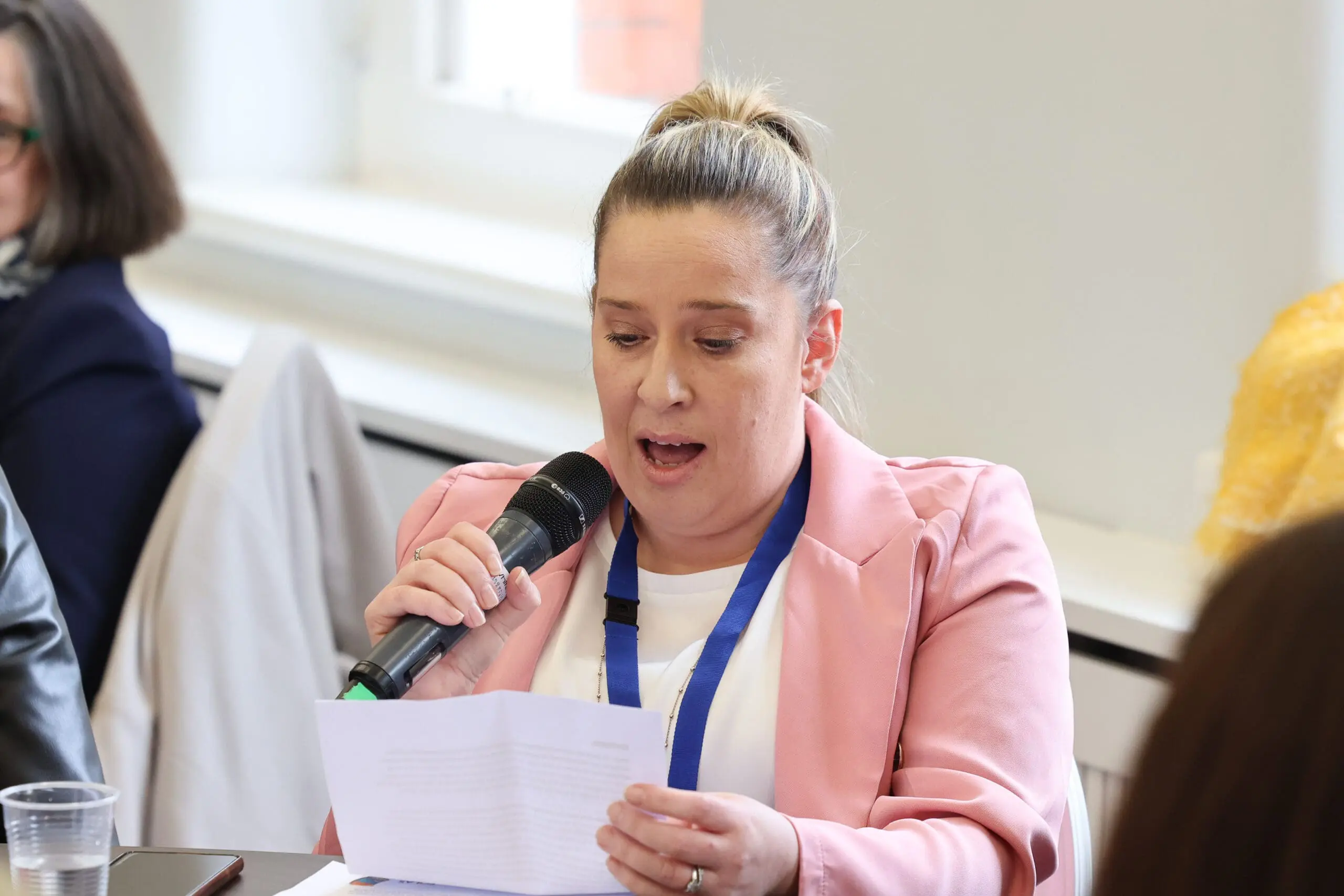 Marlene Conway from Longford Women’s Link
Marlene Conway from Longford Women’s Link
Our aim with our forthcoming campaign calling for greater investment in adult learners is to alleviate some of this strain, and to advocate for changes in Government policy that will be person-centred rather than focussed on funding courses, programmes, and buildings. This type of funding is welcome, but without investment in people and what they need, our education will continue to fail the people most in need of support.
In terms of securing that support from policymakers, we were delighted to have a keynote address from Colm O’Reardon, Secretary General of the Department of Further and Higher Education, Research, Innovation, and Science. New to the role, Colm told us that he is “in listening mode”, and learning about what people need. He said he was struck by “the determination and courage of the learners” and just how hard the first steps back to education can be. “It is often,” he said, “quite a difficult and courageous thing to do.”
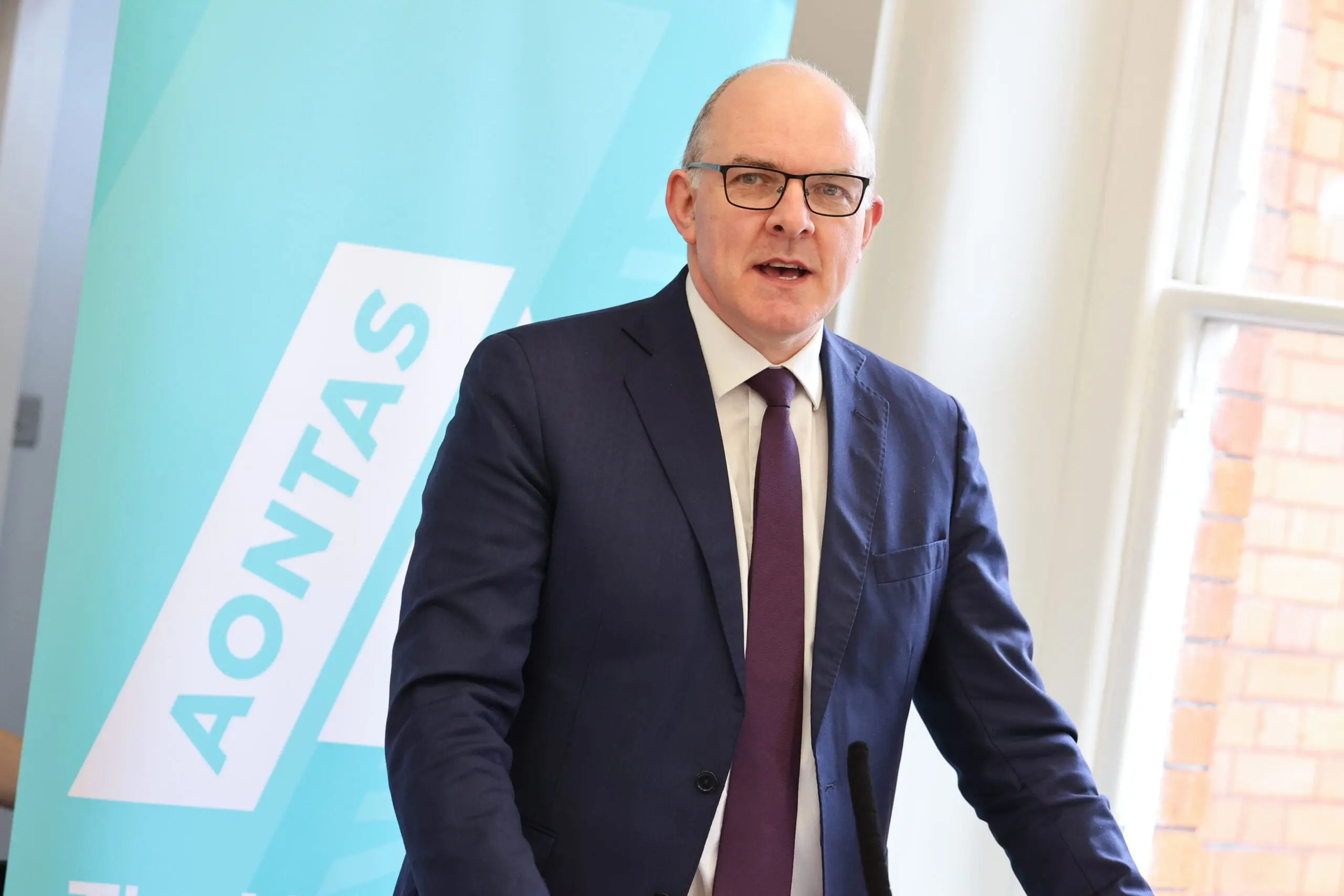 Colm O’Reardon, Secretary General of the Department of Further and Higher Education, Research, Innovation, and Science
Colm O’Reardon, Secretary General of the Department of Further and Higher Education, Research, Innovation, and Science
“Education is about freedom, empowerment, and opening up people’s lives. Education is liberation” – Colm O’Reardon, Secretary General of the Department of Further and Higher Education, Research, Innovation, and Science
Colm stated that at the Department “(we) know we need to support learners to participate in education” and are “committed to continuing the work to address the barriers to education.”
We also had a stakeholder panel, featuring Andrew Brownlee, CEO of SOLAS, Dr Austin O’Carroll, GP and Founder of Safetynet Ireland, Colleen Dube, CEO of the National Adult Literacy Agency (NALA), Dr Fiona Maloney, Director of the National Tertiary Office, and Lindsay Malone, Director of Further Education and Training at Waterford and Wexford ETB. The panel was chaired by Conor Thompson, our Policy and Development Officer.
All of the stakeholders brought together different perspectives on the topic of financial supports, and the rise in socio-political issues such as homelessness, poverty, and their relationship to education.
Austin O’Carroll is a GP practising in Dublin’s inner-city, and also an advocate for people from areas of deprivation. He spoke about his experience as a GP, and how “people in areas of deprivation have shorter and sicker lives than people in wealthier areas,” and that stress and a sense of hopelessness and worthlessness are significant factors in this.
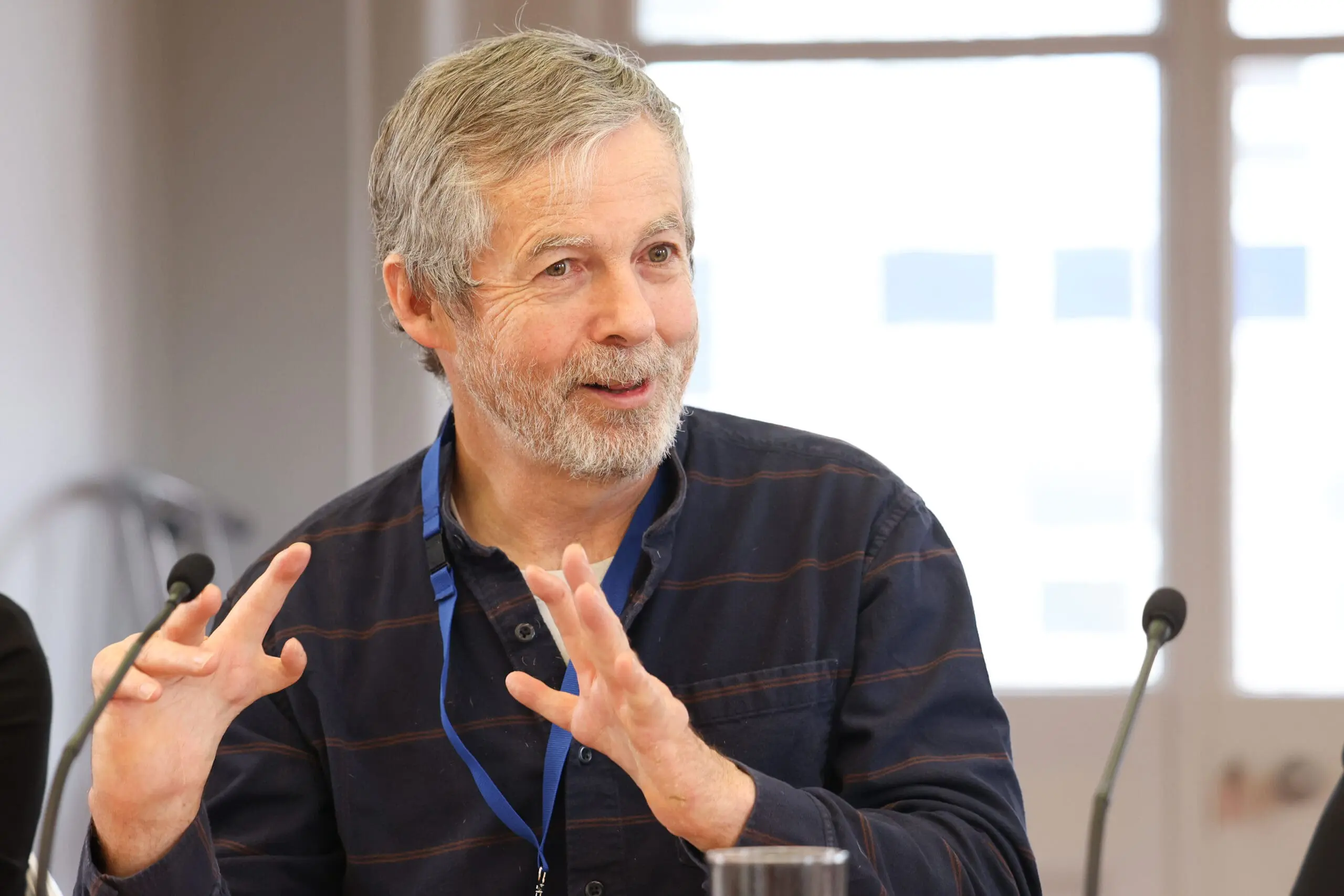 Dr Austin O’Carroll, GP and advocate in Dublin’s inner city
Dr Austin O’Carroll, GP and advocate in Dublin’s inner city
Austin talked about how people experience “not just the fact of being poor, but the fact of being poorer, and seeing this inequality.” He said that often people suffer from what he called the “double fuck” of “being born into poverty and being blamed for being poor.”
He said that adult and community education have the potential to work to address these issues. He gave an example of a couple who were homeless and living with addiction. They went on to adult education and the woman proceeded on to college – the man didn’t, and he tragically died by suicide. “Education has transformed her life,” Austin said. “But, for the man, his belief that education wasn’t for him – that’s what ultimately got to him.” He told us that “the people who most need education are the people least likely to get it.” He said that in order to have a more equal society in Ireland, greater financial support needs to go towards those people, because they are in greater need.
Andrew Brownlee spoke about the significant increase in funding for community education, which has doubled since 2019. But, he said, “it’s not enough to invest money, you have to change the system.” He acknowledged that “making more courses available is not the answer here. It’s how the learning interacts with all the local supports and services that learners need.” He stated that there is now broad recognition across Government about “how critical adult learning is to Ireland’s future,” and that now, “the key is to address the remaining barriers and ensure that learning is linked to supports and services that allow all to access and stay in education.” He said that “we have a massive opportunity because the argument is already won.”
Both Colleen Dube and Lindsay Malone spoke about communication with people who are not in the adult learning system, and the need to get the message out to those people as they are most likely to be in need of it. To the audience, Colleen posed the question: “How do we signal that learning is for everyone and how can people see themselves in the campaigns that the Government are running?” Lindsay stated that there is a lot of jargon around adult learning in Ireland, and that “we need to streamline how we communicate these initiatives to the public so people can really engage.” She said we need to “demystify” community education for the general public.
Many of the speakers mentioned the Reach Fund, which is currently open for applications for funding for community education providers across Ireland. This fund, originally the Mitigating Against Educational Disadvantage Fund (advocated for by AONTAS), is specifically designed to support the most marginalised and disadvantaged groups in our society. However, as Lindsay states, it is not streamlined, and the inconsistency in how funding is distributed means that different education centres and learners in different counties can receive different kinds of support, some more and some less.
Fiona Maloney’s contribution focussed on the need to recognise that “learning is not linear” and that we need to ‘meet people where they are at’ in their learning journey. She said that “people learn when it suits them” and we need an education system that recognises and values this flexibility. She said that “every route in FET should have access to higher education if that’s something people want”, and she also echoed the need for clear communication on this for the general public.
The final part of our “Who Does It Cost?” event was a roundtable discussion, focussing on the financial challenges faced by adult learners and AONTAS’ proposals for policy changes that can alleviate some of these challenges.
This includes closing the information gap, making it clearer and easier for people to find out what funding is available and when, including both FET and community education. It also includes increasing financial support for part-time learners. 62% of FET learners are in part-time programmes but there is no financial support to enable this group’s engagement in education, putting a lot of pressure on people to work and make ends meet while trying to continue learning. Another proposal is to increase training allowances (which are currently below the poverty line) and social welfare payments to encourage people back to education. And finally, to increase supplementary allowances towards meals, travel and accommodation, in line with the rise in the cost of living.
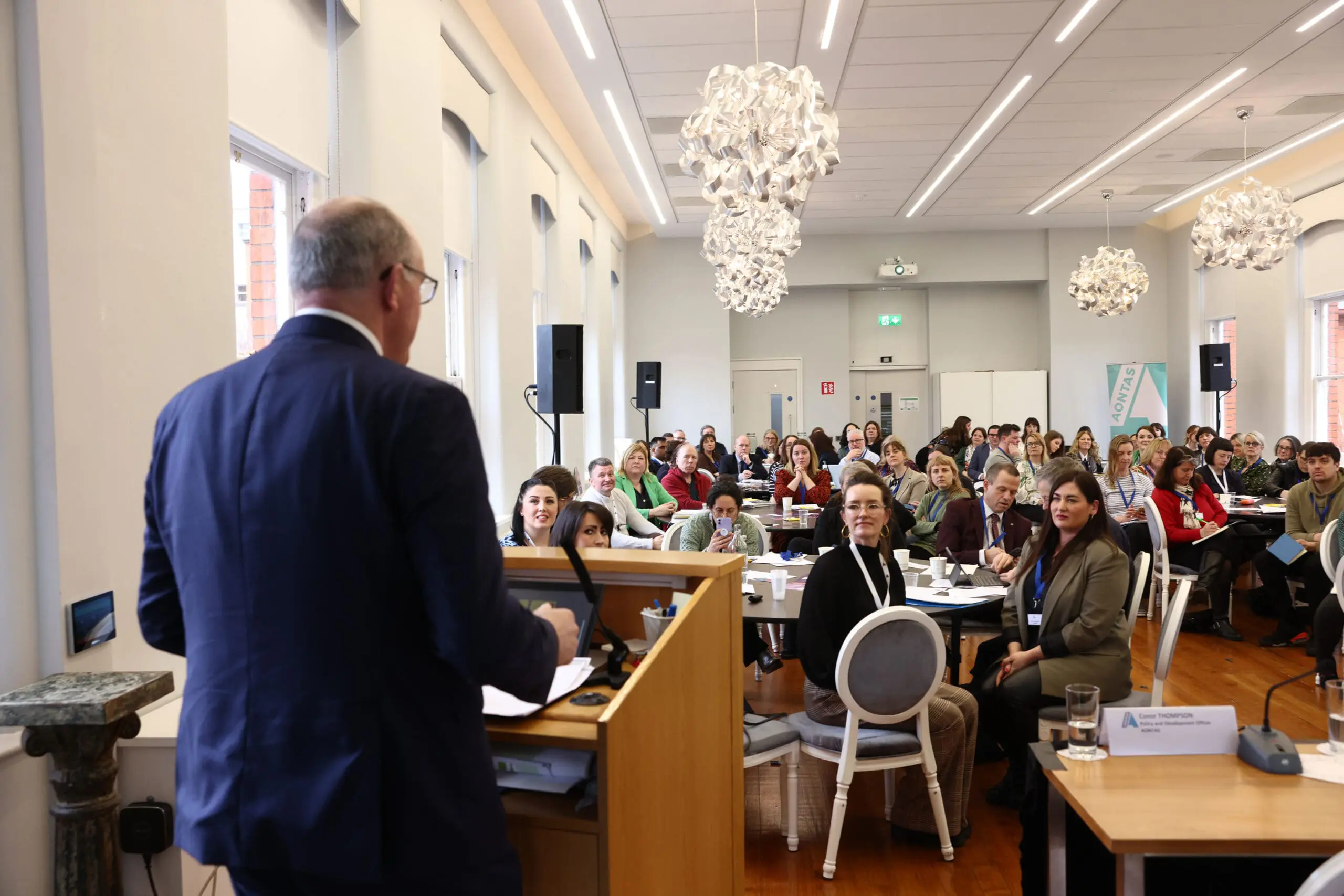 Greater investment in adult learners is essential and urgent. According to our final contributor of the day, Aisling Mortell-Beglan from Women’s Community Projects in Mullingar, “if it’s a choice between heating your house, feeding your family, or doing a course, we know what parents are going to choose. If we don’t make learning more accessible and enjoyable, we’re going to lose people.”
Greater investment in adult learners is essential and urgent. According to our final contributor of the day, Aisling Mortell-Beglan from Women’s Community Projects in Mullingar, “if it’s a choice between heating your house, feeding your family, or doing a course, we know what parents are going to choose. If we don’t make learning more accessible and enjoyable, we’re going to lose people.”
And, as reflected by Dr Austin O’Carroll, these are often the people who need education the most.
We look forward to continuing to work with our members, policymakers, and adult learners on our upcoming campaign to increase financial supports for learners.
“Who Does It Cost?” is part of the AONTAS Adult Learners’ Festival, a week-long celebration of adult learning which took place last week across the island of Ireland.
About the Festival
The Adult Learners’ Festival, happening this year from 4th to 8th March 2024, is a nationwide celebration of adult learning. This year’s theme is “Everyday Learning Spaces – Find Yourself Here,” celebrating safe and supportive learning environments, wherever they may be.
Visit this page for more details about the Festival
Find us on aontas.com or on X/Twitter, Facebook, Instagram and LinkedIN for the latest updates #ALF24 #FindYourselfHere
For more information, contact alf@aontas.com

